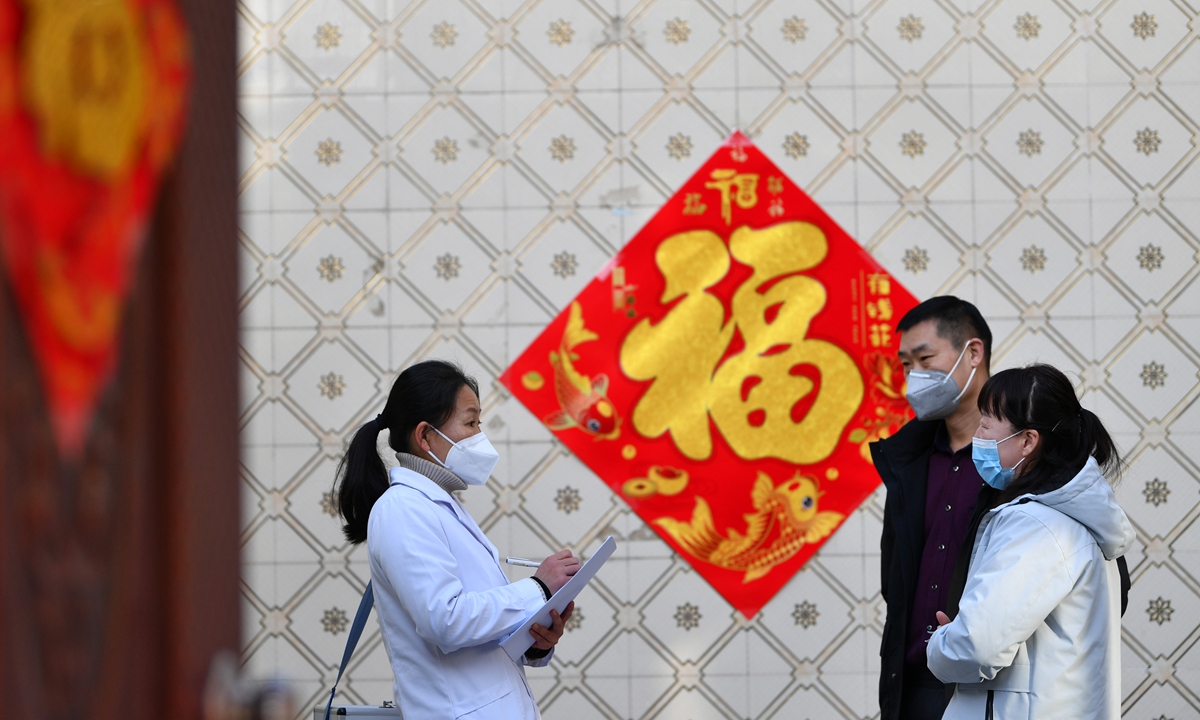New wave of mass COVID infections 'unlikely to occur' in coming months
Schools, rural areas priority for next stage response

A rural doctor follows up with residents to check their health condition in rural area of North China's Shijiazhuang on January 21, 2023. Photo: VCG
Chinese health officials and experts said on Thursday that the nationwide COVID-19 situation has generally become stable. Although a new wave of mass infections is unlikely to occur in the coming months, schools and rural areas will be the next priority for epidemic control.
China has just gone through a nationwide outbreak, from which most people have recovered while some are still recovering, said Wu Zunyou, chief epidemiologist of the Chinese Center for Disease Control and Prevention (China CDC), at Thursday's news conference.
"The overall immunity of the population is at a relatively high level," said Wu, noting that it is unlikely that a new wave of mass infections will occur in the coming months.
It is also less likely that there will be another similar large-scale COVID-19 outbreak in China again, said the top epidemiologist.
"As China optimizes its prevention and control policy, it is likely that other COVID-19 outbreaks will occur intermittently in certain areas, among some populations, and over time in the future," he said. "But there is little possibility of a nationwide mass epidemic with rapid spread within a short period of time."
In January, Wu said on his Sina Weibo account that about 80 percent of the population in China had been infected with COVID-19.
Lu Hongzhou, head of the Third People's Hospital of Shenzhen, also believed that another major COVID-19 epidemic is unlikely to occur in China within six months. "Previous studies have shown that cellular immune function is still generally high at about seven months after infection," he told the Global Times.
According to the press conference, data show that since January 1, 39 evolutionary branches have been monitored from various ports of entry to China, all of which are Omicron mutant strains, dominated by BA.5.2 and BF.7. Currently, no epidemic of new mutant strains with significantly increased transmission, immune escape capacity and pathogenicity has been detected in the country.
Experts also said that the likelihood of the future emergence of a more infectious mutant or one with enhanced pathogenicity is also very low.
At the news conference, schools and rural areas were highlighted as the key areas for the next stage of outbreak prevention and control.
As the national epidemic situation is generally stable, schools have clarified their anti-COVID policies and prepared for students to return for the spring semester. Schools nationwide are expected to be able to achieve the scheduled, normal and safe start of classes, said Liu Peijun, an official of the Ministry of Education, during Thursday's news conference.
The opening days of primary and secondary schools for the spring semester are mainly during February 1 to 15, while universities will mainly start between February 1 and 28. If no risk of an epidemic is detected, students won't delay their return to school, said Liu.
Education departments used the winter break to make plans for anti-COVID measures, proposing various support programs, including formulating a general plan for school epidemic prevention and control based on the new regulations, conducting research and supervision, strengthening departmental coordination for health monitoring of teachers and students, and following up on health services, he said.
Universities across the country have established on-campus health posts to provide health monitoring for those infected on campus.
On Monday, Chinese Vice Premier Sun Chunlan visited a number of campuses in Beijing. She urged schools at all levels to implement and optimize relevant COVID-19 prevention management and fully restore the normal operation of teaching activities.
Another area that was highlighted was rural areas. Administrators of villages are requested to contact key populations such as the elderly, disabled and pregnant women to monitor their health dynamics in a timely manner, according to officials from the Ministry of Agriculture and Rural Affairs. They stressed the importance of integrating epidemic prevention and control with spring farming.
Remote mountains, forests, pastoral areas and islands are also areas that need special attention. In these areas, officials will increase drug stockpiles and expand the form of services, such as providing online consultations.
COVID-19 antibody testing has recently been conducted in several cities of China.
Officials from the National Health Commission said this was done to measure specific antibody levels in various age groups, and urban and rural populations, to obtain the "immune background" of the population, estimate the level of antibodies in the entire population, and estimate the level of cross-protection against different mutant strains, as well as project the level of infection in the population.
Compared with schools, China's vast rural areas can be more vulnerable and at risk. Although adolescents and the elderly groups are both now widely infected, the immune protection that occurs after natural infection in adolescents is usually better, so the likelihood of a mass infection with student clusters is unlikely for half a year or even longer, Lu explained.


